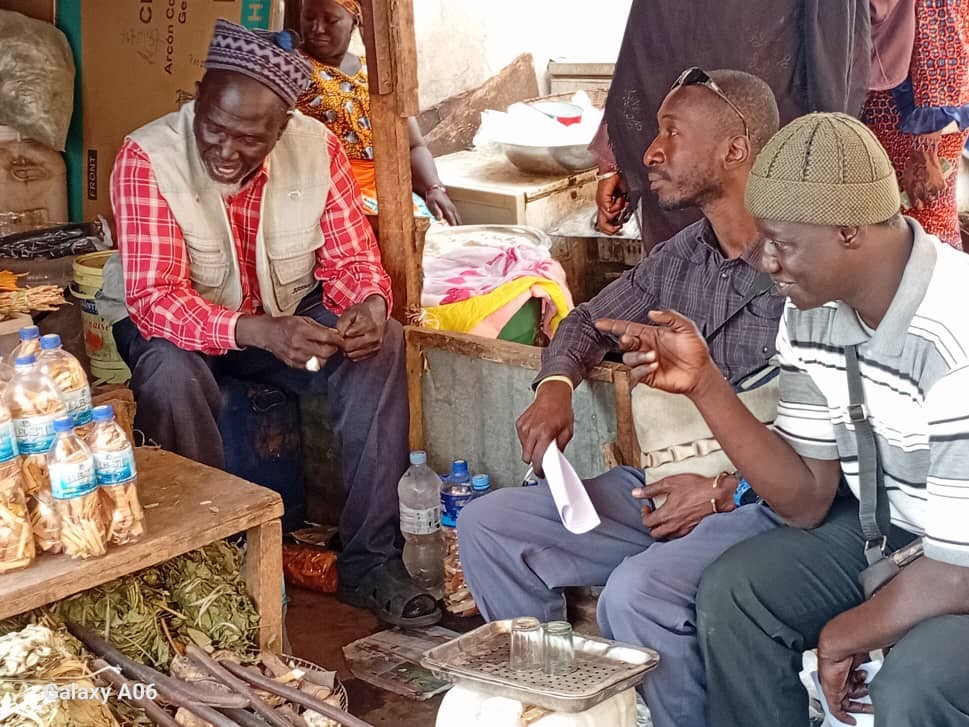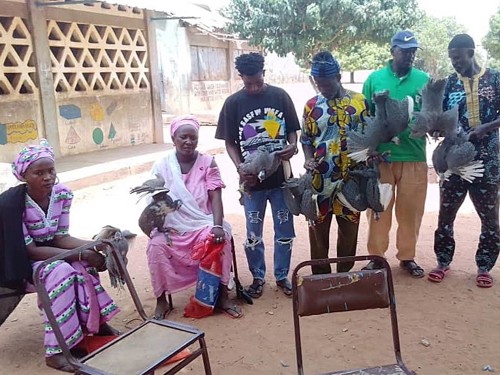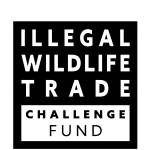Changing behaviour to protect vultures

Engaging with traditional healers at a market in Kanifing, The Gambia. Credit – West African Bird Study Association.
Behaviour change approaches to address belief-based use of vultures
While vultures are often viewed as sinister, signifying bad tidings, or even death, the vital role that vultures play in the environment is irreplaceable. Vultures act as nature’s own clean-up crew by removing carcasses, which if left to accumulate in the environment, would have a negative impact on environmental and human health.
However, these majestic birds are now facing extinction, with some species in Africa seeing a decline in numbers of up to 97% over the last 50 years. Today, 7 out of 11 African vulture species are threatened with extinction due to various threats, 6 of which are found in West Africa.
Belief-based use is the leading driver of vulture mortality in West Africa, where vulture parts are used in traditional medicine. They are believed to cure ailments, give magical powers, or bring good luck. To address this challenge, BirdLife International launched a pilot project in June 2023. The project, entitled ‘Behaviour change approaches to address belief-based use of vultures’, aimed to test social marketing approaches, adapted from Nigeria, across three West African countries – The Gambia, Guinea-Bissau, and Senegal – in collaboration with local partners.
BirdLife collaborated with the West African Bird Study Association (WABSA) in The Gambia, with the Organisation for the Defence and Development of Wetlands (ODZH) in Guinea-Bissau, and with Nature Communities Development (NCD) in Senegal. The project aimed to reduce the use of vulture parts in traditional medicine by promoting plant-based alternatives.
A key element of the project involved working with various stakeholders, including traditional healers, wildlife authorities, community leaders, and youth and women’s groups to encourage change and promote sustainable practices.

As part of project implementation, a total of 279 traditional healers, which included 59 women, were mobilised to promote medicinal plants as alternatives to vulture parts across the three countries. In Guinea-Bissau, a phytotherapy (herbal medicine) manual is being developed with input from traditional healers. They highlighted the effectiveness of roots, leaves, bark, fruits, and flowers in treating health problems.
“There are 1,533 tree species used in traditional and cultural pharmacopoeia. The most important of these are: Ceiba pentandra, Cola cordifolia, Khaya senegalensis, Parkia biglobosa and Calotropis procera,” declared the representative of the women traditional practitioners in Diaobé, Senegal.
In addition, between 2023 and 2024, quantitative surveys and focus groups were conducted in The Gambia, Guinea-Bissau, and Senegal to assess knowledge, attitudes and practices related to vultures, as well as to collect socio-demographic data useful for developing the social marketing campaign. These involved 2,427 people, far exceeding the initial target of 350.
As part of raising awareness, partners developed a campaign plan, implemented through community activities such as village meetings, awareness caravans, and radio and TV programmes. More than 3,228 people were reached by these campaigns across the 3 countries, including 1,645 women. Core messages highlighted vultures’ ecological and public health roles, the importance of community leadership, and the availability of plant-based alternatives.
In Guinea-Bissau, one village chief admitted: “I didn’t know vultures were so important. I am committed to protecting them and I will encourage people to protect them.”
“I didn’t know vultures were so important. I am committed to protecting them and I will encourage people to protect them.”
A vital element of the project was the improvement of livelihoods. To this end, guinea fowl farming was introduced as an alternative livelihood in the project area in The Gambia, with 60 birds provided to kickstart a sustainable venture. These increased tenfold to 602 by the end of the project in March 2025, providing both food security and income to over 60 community members. This income-generating activity can have long-term positive effects and be replicated in other West African countries.
Following the project, a national action plan for vultures is being developed in Senegal, while Guinea-Bissau is advancing work on a manual of medicinal plants.
The success of this initiative was made possible thanks to the role played by influential local figures. It raised awareness among a wide audience, paving the way for the promotion of vulture conservation efforts in the three countries. The lessons learned from this project can be applied in other countries to help stabilise vulture populations in West Africa.
Written by Oumar Guisse. For more information on this Illegal Wildlife Trade Challenge Fund Evidence project IWTEV010, led by BirdLife International, please click here.


 Back
Back